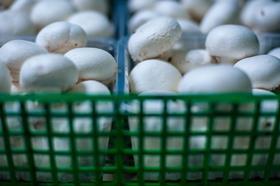
Mushrooms are often seen as the Marmite of fresh produce, but love them or loathe them, they have found their way to the forefront of British cooking. Their newfound popularity has seen value of the product increase by two per cent in the past year.
As one grower said however, it’s a tough category, and with labour costs and shortages the core concern for producers at the moment, the category is in line with the struggles of its horticultural counterparts.
Challenges unique to the mushroom category are in its geographical predominance in Ireland, and with a new Irish Sea border being proposed in Boris Johnson’s latest iteration of a Brexit Withdrawal Agreement, the potential of added bureaucracy is not something growers are relishing.
Kieran Walsh, managing director of Gold Circle mushrooms, has a wealth of experience to draw upon however when it comes to borders: “I have been in the mushroom industry for thirty years, and I worked for Monaghan when there were checks at the border so I know what’s involved,” he says. Gold Circle is based just south of the Northern Irish border at Drumhillock, Country Monaghan, and ship most of their mushrooms to the UK, with around 15 per cent going to the Republic of Ireland. “If there’s an Irish Sea border from Brexit that will bring extra hassle and paperwork,” he says.
The latest reports suggest that the customs paperwork for any barrier trade between Northern Ireland and Britain will have 50 fields to fill in, that can take nearly two hours to complete, which means most exporters will be yearning for a transition agreement before hopefully striking a free trade deal with Europe.
With or without a Brexit deal though, leaving the EU may also play into Irish growers’ favour if it becomes harder for Polish and Dutch growers to export to the UK, as demand for UK stock increases. “From that point of view we are in a competitive situation,” Walsh says.
“Brexit at first did hurt us, we weren’t prepared. We had to cut costs and we did all that,’ adds Walsh, who has committed to a proactive and positive position in the face of current instability. “You have to be positive. We have to be able to grow to stay alive, but if you step back and look at supply and demand it’s looking good.”
Despite being a mature category there is a sense that anything is possible with mushrooms due to their versatility. Prepared options are endless with one grower saying they are expanding into prepared, with products such as stuffed mushrooms. “We’re looking at added value too,” concurs Walsh. Exotic and more niche mushrooms are also seen as an area to diversify into, although volumes are currently small.
“Look at the plant-based diet movement, it’s the vegetable with the most versatile texture, and it’s the only vegetable to have Vitamin D in it. The future of mushrooms has to be big, there’s a marketing job to be done but there’s huge opportunity in mushrooms. It’s ticking all the boxes,” reflects Walsh.
Walsh says Gold Circle has been working out how to automate part of the picking process to combat labour shortages. But In the meantime one of the biggest recent efficiency gains for Gold Circle was the completion of a new high-spec seven-acre compost facility in Northern Ireland, which will serve growers for the Northway Mushrooms cooperative, of which Walsh is a member.
“The constructors say it’s one of the most state-of-art compost producers out there,” says Walsh. “For me as a grower I was competing before with the big names like Walsh Mushrooms, but with our own compost as a group it changes the game. All of a sudden I’m not dependent on my competitors for compost.” The new compost is already boosting yields and quality according to Walsh.
Despite the current headwinds, the fundamentals seem to be in place for growers like Walsh going forward. “We would look to expand over the next few years, but we’ll wait for it all to settle down,” he reflects.



